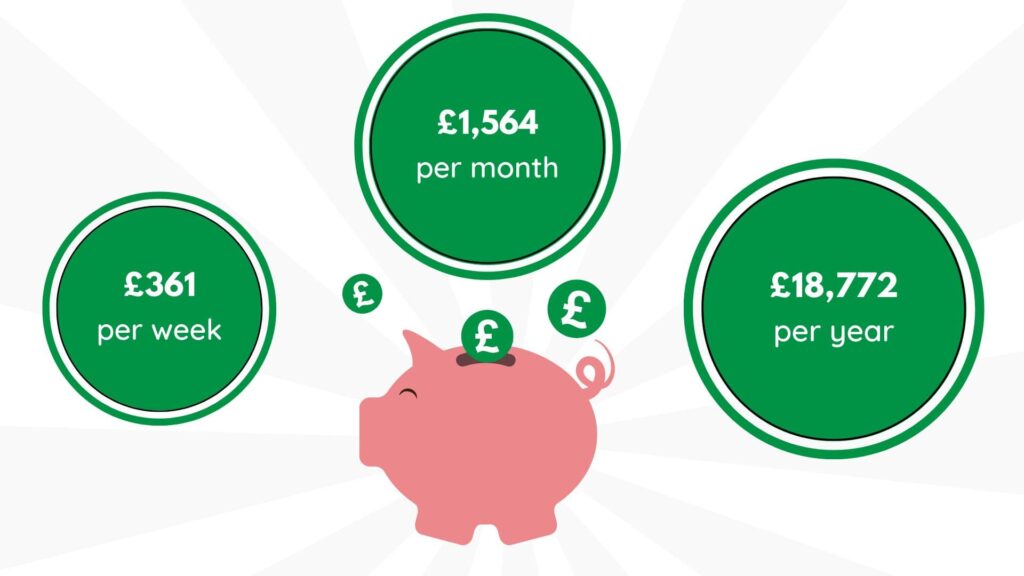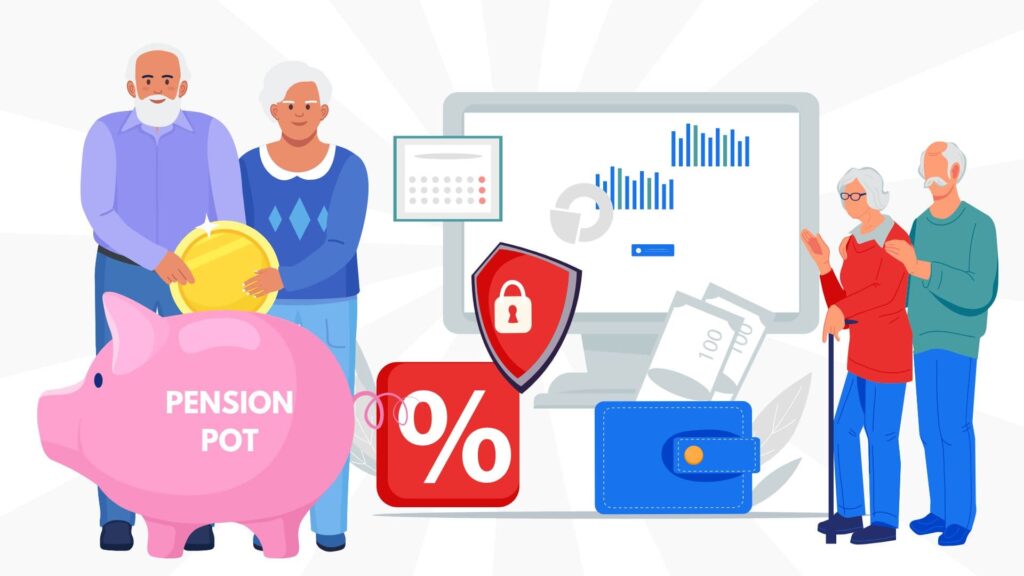
Sammie Ellard-King
I’m Sammie, a money expert and business owner passionate about helping you take control of your wallet. My mission with Up the Gains is to create a safe space to help improve your finances, cut your costs and make you feel good while doing it.

Quickfire Roundup:
The average pension pot in the UK is currently £18,772 per year. This is just about enough to cover basic necessities.
Geography and age also play a part, with people over 55 living in the South East statistically likely to have the biggest pension pot.
Most people supplement their state pension with their investments and contributions to boost their retirement income.
This can be done by making one-off payments, claiming tax relief, and paying tax-free lump sums.
Pensions can be confusing. But with your future finances at stake, it’s something worth getting right sooner rather than later.
But how are you supposed to know what a good pension pot is? And how does your pension pot stack up against the average pension pot in the UK?
This guide will cover everything you need to know about the average UK pension pot, including how to increase your pension contributions and the best UK pension providers.
Table of Contents
Average Pension Pot UK

The average UK retirement income is £361 per week, £1,564 per month, and £18,772 per year after housing costs. This might be enough for everyday essentials but it certainly doesn’t allow for a comfortable retirement.
However, the basic state pension only accounts for £156.20 per week, meaning most people are relying on more money from a private pension to fund their retirement.
The average UK pension pot changes from time to time and could well be very different by the time your retirement rolls around.
Keeping an eye on how much the average person needs for a comfortable retirement can help you plan ahead so you can enjoy your twilight years as much as possible.
What Factors Can Impact My Pension?
There are a number of things that can impact your actual pension amount and it’s important to know what might boost or lower your pension pot while you still have time.
Here are just some of the things that can impact your pension:
Age
The age you retire directly affects how long your pension needs to stretch for.
For example, retiring at 50 might sound great but if you don’t have enough cash saved up, you could struggle to afford basic necessities during retirement.
Retiring at 80, on the other hand, will mean your retirement income doesn’t have to stretch quite as far.
Location
Surprisingly, a pension provider will sometimes look at mortality rates in your postcode to calculate how much yearly income you will receive.
There is, unfortunately, nothing you can do about this but it is still worth keeping in mind if you are planning to relocate once you reach pension age.
Work
For most people, a workplace pension is based on earnings. So the better annual income you have, the better your workplace pension pot is likely to be come retirement age.
Some people have a defined benefit (DB) pension which is a type of workplace pension based on your salary and how long you’ve worked for your current employer.

Average UK Pension by Location
The mean pension amount can differ depending on where you live in the UK. Here is a rough guide to what you can expect based on where you live:
| Scotland | £19,044 |
| Northern Ireland | £14,972 |
| North East | £17,684 |
| North West | £16,392 |
| East Midlands | £19,271 |
| West Midlands | £19,293 |
| Wales | £17,367 |
| South East | £27,584 |
| South West | £20,723 |
| Greater London | £22,315 |
So many factors can impact the average UK pension and the actual amount you will receive will vary.
However, this information can help you see at a glance where the best and worst pension pot amounts tend to be depending on which part of the country you live in.
To make things even more complicated, there are also slight differences in each of these regions based on gender. Overall, there is a 38% gap between male and female pension pots across the wider UK.
Average Pension Pot by Age
Age is another factor that can have a significant impact on your pension income. Here is the average predicted pension pot size for each age group at the state pension age:
- 16-24 – £2,700
- 25-34 – £9,300
- 35-44 – £30,000
- 45-54 – £75,500
- 55-64 – £107,300
The average pension size can change over time based on a number of external factors. The gender gap also tends to widen as women get older with men’s pension pots almost double that of women’s by the age of 50.
The earlier you start saving for your pension, the more compound interest you can accumulate. This can help you build a bigger pension pot over time so you have a higher income by the time you retire.
With the average savings of a 30 year old at just £6,000 if you’re above this you’re well on your way!
What Is a Good Pension Pot Amount?
These days, knowing whether you’ve got enough in your pension pot is a common worry among both old and young people.
Some financial advisors recommend saving a minimum of ten times your annual salary before you retire. So, if your annual salary is £40,000, you should aim for a pension pot of around £400,000.
Others believe as much as 12.5% of your monthly salary should go towards your pension. So, with an annual salary of £40,000, this would be about £416 per month.
Having a workplace pension can help with this method as your employer should match your contribution.
This is, however, just advice and doesn’t necessarily mean you won’t be able to enjoy a comfortable retirement on anything less than that.
The ideal pension is also largely subjective because what is considered a good pension pot will differ depending on a person’s location, lifestyle, and retirement plans.
Some people might be perfectly happy with the state pension amount while others might be less than impressed.

How Can I Increase My Pension Contributions?
Maximising your pension savings can give you peace of mind if your state pension isn’t quite as much as you thought it would be.
More and more people are choosing to put some cash aside to help boost their annual retirement income amount when the time comes.
So, what can you do to increase your pension savings? Here are some top tips:
Make one-off payments
Making one-off payments if and when you can is a great way to build a good pension pot.
This can be anything from money left over from the weekly shop to a bonus you received at work.
These payments can’t be matched by an employer but they’ll still be tax-free.
Claim tax relief
Some pension schemes take your contributions directly from the part of your salary that has already been taxed.
This means if your tax rate is higher than 20%, you might be eligible to claim further tax relief through HMRC.
Pay a tax-free lump sum
Coming into some cash can be a great excuse to submit a big chunk of money towards your pension.
For example, if you were to put £1,000 towards your pension pot, tax relief will be applied to the first £250.
The actual amount depends on your individual circumstances.
Can I Withdraw My Pension Before 55?
Generally, you can’t withdraw any money from your pension before you turn 55. But there are some exceptions to this rule.

One of the few times when you can withdraw your pension before 55 is if you’re in poor health and are either unable to continue working or are not expected to live for more than a year.
Some pension schemes also offer benefits to people with lower life expectancies.
One of the other exceptions to the 55 rule is if your profession has a lower-than-average retirement age, such as professional athletes and airline pilots.
Some private pensions allow you to withdraw money before 55 but there will usually be a penalty fee involved.
Cashing in money from your pension before you turn 55 will also incur a 55% income tax bill from HMRC.
How to Get the Most of Your Pension
There are steps you can take to boost your pension contributions but it’s what you do with them that counts.
Here are just some of the ways you can make the most of your pension contributions to improve your pension wealth:
Combine old pension pots
Most people have pension savings from different jobs sitting in different accounts but there are several advantages to consolidating them.
Because schemes come with different fees, moving all of your pensions into a lower-cost scheme can help you keep costs down.
Regularly review your personal pensions
Reviewing your personal pensions on a regular basis is a good way to check you’re getting the most out of them.
This can help you identify areas where you could be saving more. Even the slightest changes can make a huge difference to your final pension amount.
Shop around
Millions of people just accept their workplace or state pension without shopping around for a personal pension plan.
But by reviewing your options, you could find a better deal and boost your pension pot amount. From stakeholder pensions to drawdown pensions, there are so many options out there.
Why a Good Pension Pot Is Important
We all know a good pension pot is important but knowing why it’s important can be trickier to determine. This is especially important if you’re self-employed or have an irregular income.
Some people naively assume they’ll have enough money saved up by the time they reach retirement age but, for most, the state pension is barely enough to make ends meet.
Because of this, more and more people are relying on a personal pension on top of their state pension to bridge the gap.
Knowing this in your 20s is all well and good but leaving it until your 40s can mean it’s too late to save a decent amount before you retire.
Best Pension Providers in the UK
The best pension providers in the UK change from time to time and the best pension plan for someone else might not necessarily be the best option for you.
Here is a simple guide to the best places to get a pension in the UK:
Moneyfarm
Moneyfarm is a popular pension provider that can give you access to free financial advice and lower-than-average fees.
Their expertly-trained advisors also handle everything on your behalf so you know your money is in good hands.
Wealthify
Wealthify is popular because it’s simple and straightforward to use.
They offer a range of investment options to suit your financial circumstances and the platform couldn’t be easier to navigate.
FAQs
Why has my pension pot dropped in value?
The majority of your pension pot is made up of investments, such as stocks and shares, and when they drop in value, your money will also decrease in value.
Because your pension pot is based on economic, political, and stock market trends, past performance isn’t always an indication of future performance.
Can I cash in my entire pension pot?
There is nothing stopping you from taking your entire pension pot out in cash when you reach a certain age.
However, only 25% will be declared tax-free and the rest will be taxed as if it was income. For example, if your pension is £50,000, then £12,500 won’t be taxed but the remaining £37,500 will.
What is an annuity?
An annuity is an insurance contract that provides you with a monthly income during retirement.
It is a popular alternative to a workplace or personal pension because it is designed to provide you with a regular income for the rest of your life.
Final Thoughts
Comparing your pension against the national average can be a difficult pill to swallow. But there are things you can do to boost your pension income and safeguard your financial future.
The earlier you can start saving for your retirement, the better your annual income will be when you reach pension age.
MORE LIKE THIS
Share on social media
Disclaimer: Content on this page is for informational purposes and does not constitute financial advice. Always do your own research before making a financially related decision.



